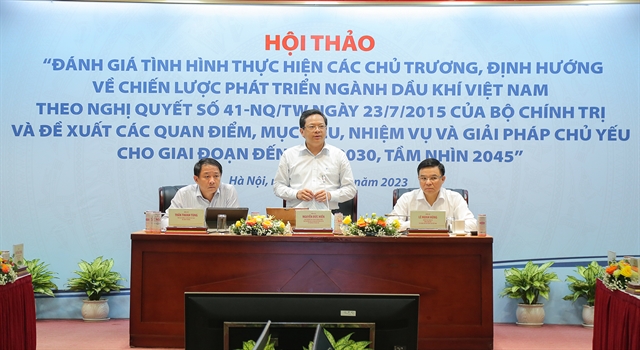Various proposals have been put forth by experts and industry insiders to ensure the oil and gas sector keeps pace with the times, overcomes existing challenges.

Various proposals were put forth by experts and industry insiders to ensure the oil and gas sector keeps pace with the times, overcomes existing challenges, and establishes specialised policies for sustainable growth at a workshop jointly hosted by the Communist Party of Việt Nam (CPV) Central Committee's Economic Commission and Vietnam National Oil and Gas Group (Petrovietnam) on September 8.
At the workshop, there was a strong emphasis on the need for the CPV's Politburo to promptly consider issuing a new resolution titled 'Strategic Directions for Development of Việt Nam's Oil and Gas Sector by 2030, with a Vision to 2045'.
This collaborative workshop, organised to assess the implementation of strategic policies for Việt Nam's oil and gas industry as per Politburo Resolution No. 41-NQ/TW dated July 23, 2015, also aimed to propose key objectives, tasks, and solutions for the period up to 2030 with a vision to 2045.
The event saw participation from representatives of the CPV's Central Committee's Office, the Ministry of Industry and Trade, the Commission for Management of State Capital at Enterprises, various provinces and cities, the Vietnam Oil and Gas Association, and Petrovietnam's member units.
Lê Mạnh Hùng, Petrovietnam's General Director, opened the workshop by underlining Petrovietnam's impressive 62-year tradition and 48-year development journey, emphasising its pivotal role as a leading economic conglomerate in Việt Nam. He acknowledged the Group's substantial contributions to the nation's socio-economic development and the successful completion of tasks outlined in Resolution No. 41-NQ/TW over the past seven years.
However, Hùng candidly recognised the sector's new challenges and complexities arising from geographic scope, operating areas, policy mechanisms, market dynamics, digital transformation, green transition, circular economy, and more. These challenges necessitate a comprehensive and objective analysis to propose strategic adjustments for the coming years.
During the workshop, Nguyễn Đức Hiển, Deputy Head of the Party Central Committee's Economic Commission and Head of the Editorial Team, presented the main aspects of the draft report assessing the implementation of Resolution No. 41-NQ/TW. He stressed the importance of soliciting feedback from experts, Petrovietnam's management, and relevant ministries and sectors on key topics such as propaganda, Resolution 41-NQ/TW implementation, institutionalisation, specific goals, and results achieved, as well as limitations, challenges, and solutions.
Hiển encouraged experts to engage in open and objective discussions, considering both domestic and international contexts. He urged them to propose specific views, objectives, and directions, particularly concerning the oil and gas market, infrastructure development, capital attraction, scientific and technological advancement, human resource development, international cooperation, green growth, and sustainable development, with Petrovietnam as the central player in the national energy conglomerate.
The workshop primarily focused on evaluating the implementation of Resolution No. 41-NQ/TW, achieving its goals and objectives, and exploring Việt Nam's oil and gas potential. It also delved into new approaches for the sector's development strategy in the current context, improving regulatory mechanisms, laws, and policies for oil and gas development by 2030, with a vision to 2045. Additionally, the workshop addressed strategic oil reserves and enhancing the operational mechanisms of the fuel market to meet domestic demand while integrating national defense, security, and foreign affairs into Việt Nam's oil and gas sector.
In closing, Hiển confirmed that the workshop's feedback would be meticulously absorbed and integrated during the preparation and finalisation of the report, which will be tabled to the Politburo for further consideration. — VNS




